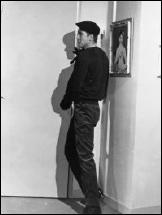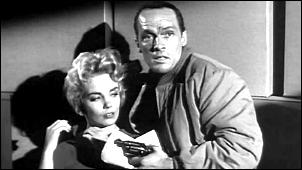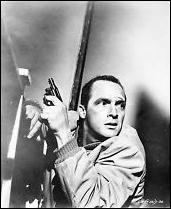Wed 14 Jan 2015
A Movie Review by David Vineyard: LADIES THEY TALK ABOUT (1933).
Posted by Steve under Crime Films , Reviews[8] Comments
LADIES THEY TALK ABOUT. Warner Brothers, 1933. Barbara Stanwyck, Preston Foster, Lyle Talbot, Tully Marshall, Harold Huber, Dorothy Burgess Directed by Howard Bretherton and William Keighley
Made on the cusp of the code, this one is almost as tough as it wants to be, with Stanwyck as Nan Taylor, a smart moll who ends up in San Quentin for a bank robbery she aided a hood named Don (Lyle Talbot) in committing.
This is typical women in prison, and exactly what you would expect from Warners in this era. Stanwyck sets up to con radio crusading do-gooder David Slade (Preston Foster) in order to keep out of prison, and he arranges for her pardon to keep her from prison and falls for her (mutually). But when he finds out she was conning him originally the sanctimonious fool refuses to vouch for her, and she is off to prison. Now the idiot realizes he loves her but it’s too late.
Apparently women who look like Stanwyck are disposable in his life.
Foster does what he can with Slade, but among all these colorful types, Clark Gable couldn’t make him anything but a stiff. Casting a tough guy like Foster helps, just not enough.
I should point out I’m editorializing. The film is much kinder to the noble Slade. I personally found him a huge pain in the lower rear anatomy. Dumb and sanctimonious, the perfect hero.
Prison is the usual Grand Hotel collection of types: the Duchess, the grand dame of the place who put ground glass in a rival’s food; the aging madam who ran a ‘beauty parlor’; the cigar smoking butch, the rival who will do anything to keep Stanwyck from Slade; and of course the instant best friend (Dorothy Burgess).
The women’s wing of San Quentin is no cake-walk, but it’s damn glamorous for a prison. There is no shortage of sheer nighties, baby dolls, frilly undies, make up, perms, nylons, suspender belts, and high heels. Save for the ‘butch’ (“Watch out, she likes to wrestleâ€) there’s not a sensible flat heel in the joint.
Hard hitting realism, Hollywood style.
An embittered Stanwyck helps Don (Talbot) and pal Dutch (Huber) plan an escape, and when Dave visits even slips a note in his pocket for him to mail unwittingly helping. When the escape goes wrong and Don is killed she thinks Dave found the note and betrayed her. She swears to kill him.
When she’s released (short sentences for bank robbery back then) she tracks Dave down to a revival where he is speaking. There she gets him alone and shoots him, but then realizes she loves him and he didn’t betray her. You know how women with guns are. He’s willing to forget the bullet, he loves her, but plainclothes cop Tracy shows up (Tully Marshall, and it’s a full year before Plainclothes Dick appeared in the Chicago Tribune).
“You ought to have that seen to … gunshots can be tricky,†but suspicion or not, Dave finally grows a pair and stands by his woman. Final clench and they live happily ever after producing little jail birds and revivalists — after a proper period of marital bliss of course. Considering Nan, they better wait at least three years, she is clearly a lady they talk about.
Ladies They Talk About is a typical little Warner’s picture from the era, with Stanwyck always good in these tough but vulnerable broad roles. Like her, the movie is smart, quick, sassy, and nice to look at.
The problem is she is alone in this film. There is no one here who can match her. She’s Stanwyck, and at best they are Preston Foster and Lyle Talbot. I like both actors, but matching them up with Stanwyck is like putting Pee Wee Herman in the ring with Ali. They don’t stand a chance in hell. This is a bit lightweight for Warners from this era, not quite one thing or another, and leaves Stanwyck standing center ring alone for most of the movie.
Bette Davis could have at least loaned her George Brent.
That said, if you buy the happy moral ending, no doubt code imposed, I have some land in New Mexico next to the White Sands testing grounds you might want to purchase. Nice place save for the black glass.
Stanwyck’s Nan Taylor is always going to be smarter, classier, and more volatile than her bland do-gooder reformer. Even in a pinafore, gingham, and a pink bow you know Nan will have a flask under her garter and be sneaking cigarettes when Dave isn’t looking. While Dave leads revivals Nan’s going to be nostalgic for bathtub gin, speakeasies, and flash types she used to twirl around her fingers. It’s hard to imagine the pious women of Dave’s revivalist movement are going to welcome an ex-con who matriculated at San Quentin to the fold.
But then, come to think of it, considering the wan, pale, types Dave spends most of his time with, maybe he’s a very lucky man to come home to Nan’s flash and hidden cigarettes. What’s a little bullet now and then compared to love?
At least she won’t be dull, and at a fast sixty nine minutes neither is the movie.


